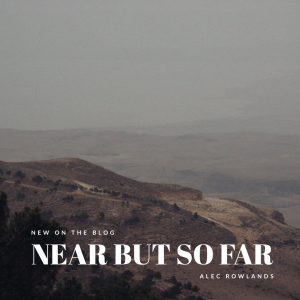Near But So Far

It was one of those experiences I’ll never forget.
Two of my colleagues and I were visiting Jordan to explore the possibility of our church getting involved in mission work there.
We had been assigned a driver for the duration of our trip, a local Christian from the town of Medeba. He had taken us to see Petra, some of the ruins dating back to Biblical times, and the Jabbok River, where Jacob wrestled with the Lord. All pretty amazing and faith-inspiring!
In the process, we developed quite a relationship with the young man…who I probably shouldn’t name just in case it might be a security issue for him now. Over the miles we talked a lot about the condition of the Church in Jordan, about Israel and their place in the region, and about the risks of publicly sharing your faith in Jordan.
One of the last places he took us to see was Mount Nebo (see cover photo).
Nebo is one of the peaks that form a ridge that runs north/south, parallel to and looking down on the Jordan River and Dead Sea.
On a clear day we were told you could see the rooftops of buildings in Jerusalem from Mount Nebo. It was pretty hazy the day we were there.
Nebo is where God took Moses to look out over the Promised Land one final time and then to die (Deuteronomy 32:49).
Frederick Buchner writes about the story that “When he (Moses) finally had it all but made on the top of Mt. Nebo, where the whole Promised Land stretched out before them as far as the eye could see, God spoke up and said this was the place all right, but for reasons that were never made entirely clear, Moses was not to enter it with them. So, he died there in his one hundred and twentieth year, and after a month of hanging around and wishing they’d treated him better, the Israelites went on in without him.” (published in Peculiar Treasures)
I don’t agree that the reasons for Moses not getting to enter the Promised Land were “not entirely clear,” as Buechner writes. God told Moses that the reason was because Moses struck the rock to produce water for the people out of impatient anger and in so doing dishonored the Lord who was the provider of the water.
God had told Moses just to speak to the rock and that He would provide the water (Numbers 20:8).
But Moses was angry with the people at the time and hit the rock instead with his staff.
It was a careless obedience on Moses’ part, excused in his mind perhaps by his anger towards the people who had been grumbling against him again. Moses’ actions were actually disobedience and it cost him getting to go into the land.
And he died up there on Nebo.
So, my two colleagues and I stood on top of Nebo, looking out over the Promised Land, and, with no other tourists around, took the opportunity to call on the Lord for ourselves and the church we serve. We asked the Lord to please give us the kind of humility and heart before Him and the people that we would not get so close to His promises but miss actually getting to go in and occupy the land through disobedience.
It was a sobering moment for us.
We probably had been praying for 5-6 minutes when we noticed that our driver, standing with us, was also praying, but in Arabic, with tears running down his face.
When we were done and walking back to the car, I asked him if he would be comfortable telling us what he was praying for on Mount Nebo that stirred his heart so much.
He said he was asking the Lord for the people of Jordan, that being so geographically close to where God’s plan of salvation was worked out for the whole world, that they would not miss God’s promise of entering His eternal rest (Hebrews 4).
I am not saying that we need to live in the fear of being excluded from God’s promises, but I do believe that a healthy fear of the Lord produces a humility in our obedience to His commands that keeps us from presumption or casual obedience.
I do not want to be so near…but actually also so far from all He has for my life.
